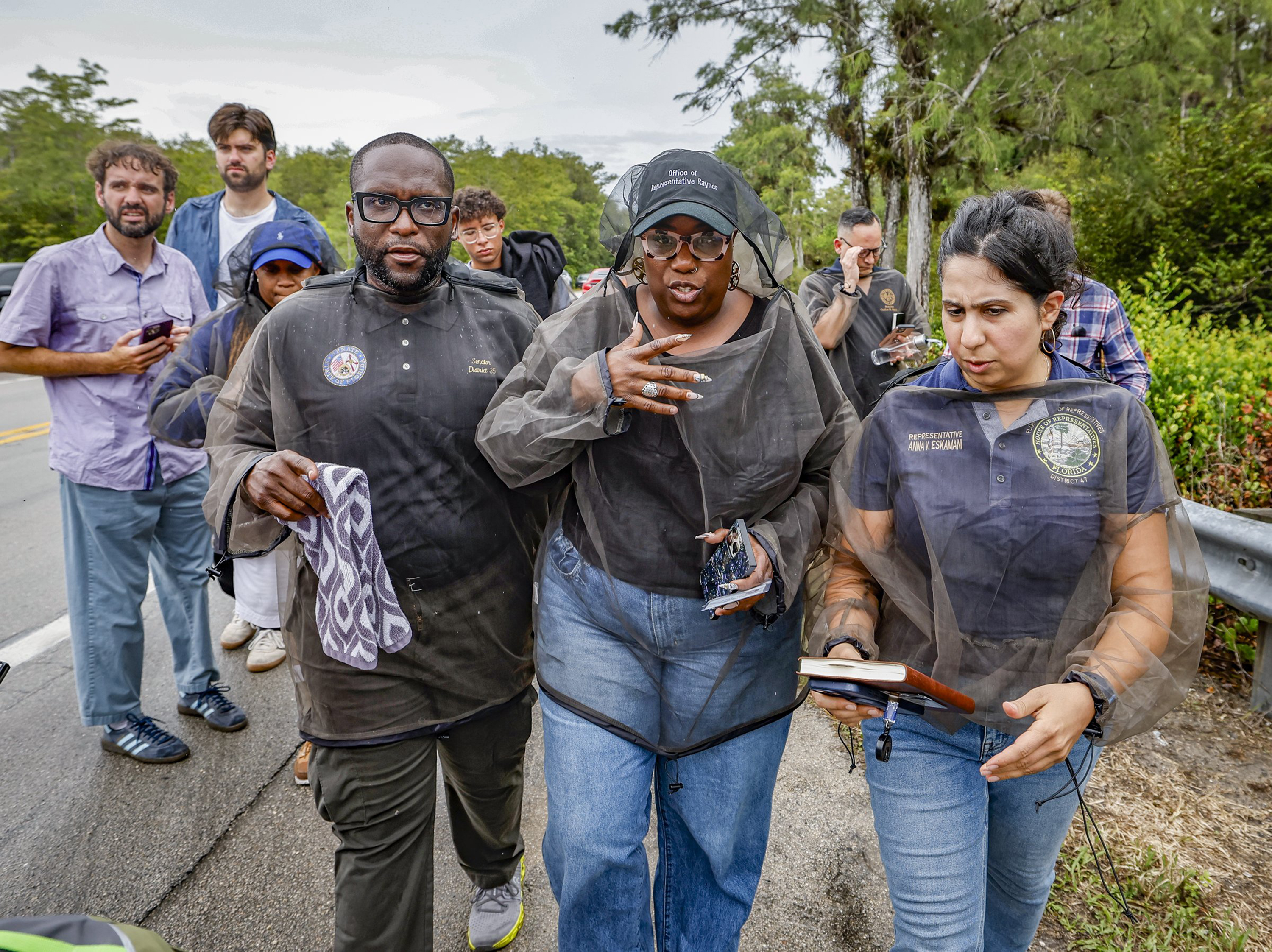
Mother Jones illustration; Andrew Caballero/AFP/Getty, Al Diaz/Miami Herald/Tribune News Service/Getty
Earlier this month, Florida Rep. Anna Eskamani, a Democrat from Orlando, joined several state lawmakers on a tour inside Alligator Alcatraz. When Eskamani entered a large white tent where detainees are separated into chain-link fenced areas, each containing 32 beds and three toilets, the men began chanting “Libertad!”—which means liberty in Spanish.
Eskamani and the other lawmakers, who had sued Florida Gov. Ron DeSantis after previously being denied access to the facility, were not allowed to speak to detainees. Florida Division of Emergency Management director Kevin Guthrie, who guided the tour, said the facility was housing about 900 immigrants and would be able to accommodate up to 4,000 by the end of August, Eskamani says.
State Sen. Shevrin Jones, a Democrat from Miami-Dade County, was also there and recalls that someone with a thermometer showed that the temperature at the entrance of one of the tents was 81 degrees. He noticed that one of the detainees was bare-chested, with his shirt wrapped around his head.
Jones, whose office is in touch with some families, read me a text he received from a detainee’s wife. She wrote that one of the men in her husband’s cell was using the toilet when guards had ordered the men to stand by their beds for a head count. Guards began to yell at him. In another text, she wrote, “He told me that [the guards] all flip their badges over so that you can’t read their names.” The text continued, “The mosquitoes are getting worse, and they don’t spray them with bug spray.”
In the days since the tour, Eskamani says she has heard reports from detainees’ loved ones of rampant mosquitoes swarming the tents, as well as leaks after summer rainstorms. “In a weather situation, not even a hurricane, just a general rainy day in Florida,” Eskamani says, “this facility is not one that is sustainable.”

Hastily erected on a remote airfield by Big Cypress National Preserve, and predicted to cost $450 million per year to run, Alligator Alcatraz has been unusually controversial even within the already controversial area of immigration detention. As reported by family members, attorneys, and lawmakers, the facility is fraught with malfunctioning air conditioners, scarce food, and no recreational time for detainees. State and federal officials running the center have previously stated that it would hold immigrants with criminal records. But as the Miami Herald recently reported, many detainees have no prior arrests. One is a 15-year-old boy. Another is a recipient of DACA, an Obama-era program that provides temporary legal status to immigrants who came to the US as children. In addition, environmental groups have accused Florida and federal officials of opening the center in the middle of the Everglades without first weighing the environmental risks. Alligator Alcatraz is the only immigration detention facility that a single state is responsible for both creating and managing.
Even before the second Trump term, Florida had distinguished itself for its outsized approach to immigration. Florida State Republicans have pursued aggressive immigration enforcement laws, including one that criminalized the act of driving undocumented immigrants into the state, and another that made it a crime to reside in Florida without legal status. Both were blocked by courts that ruled that immigration enforcement is a federal responsibility. As I reported in April, Florida also leads the nation in the number of 287(g) agreements between local law enforcement and Immigration and Customs Enforcement. Alligator Alcatraz is a kind of crucible for what can happen when federal enforcement efforts are fully supported by a sympathetic state infrastructure, while those who are taken there reportedly face nearly inhumane conditions. Emma Winger, deputy legal director at the American Immigration Council, describes the new detention camp as “a culmination of Florida and the governor’s efforts to essentially create its own immigration system.”
The new detention camp is “a culmination of Florida and the governor’s efforts to essentially create its own immigration system.”
The Florida Division of Emergency Management, which runs Alligator Alcatraz, has not responded to my requests for comment. An ICE spokesperson referred me to the Florida emergency agency for further information on the facility.
For Rep. Eskamani, Alligator Alcatraz is “a political stunt with environmental damage and everyday lives being harmed. It needs to close immediately.”
The detention camp is now at the center of several lawsuits. As I reported last month, environmentalist groups sued Florida and federal officials to shut down Alligator Alcatraz, arguing that the project moved forward without an environmental assessment or public comment.
The groups also raised concerns about the detention camp’s impact on the area’s various ecosystems and wildlife. Traffic to and from the detention site increases the likelihood of panthers being struck by vehicles, according to court filings, and light pollution could destroy the nighttime foraging abilities of bats in the area. Aerial photos also indicate that previously undeveloped areas are now paved over with asphalt.

Other parties have also weighed in on the case. The advocacy group Florida Immigrant Coalition filed an amicus brief arguing that “only the federal government can authorize a place of immigration detention.” And the Miccosukee Tribe of Indians, which has resided in the preserve near the detention facility for generations, filed a motion in support of the lawsuit. Today, there are 15 active villages within Big Cypress National Preserve. “The facility’s proximity to the Tribe’s villages, sacred and ceremonial sites, traditional hunting grounds, and other lands protected by the Tribe raises significant concerns about environmental degradation and potential impacts caused by the construction and operation of a detention facility,” their filing states.
In its response to the lawsuit, the US Department of Homeland Security said it was not in charge of operations at Alligator Alcatraz, and that the facility was solely the responsibility of Florida, “using state funds on state lands under state emergency authority.” In what appears to be a Catch-22, the state argued the environmentalist groups are seeking relief under the National Environmental Policy Act, which does not apply to state agencies. A hearing is scheduled for August 6.
Last week, another lawsuit was filed against officials operating the facility. Since the detention camp’s opening, attorneys have reported being unable to have contact with or speak to detainees. Several law firms, with support from the American Civil Liberties Union, sued in federal court to gain access to their clients. Some have driven to the facility to ask how they can meet with clients, only to be provided with an email address to schedule an appointment that resulted in bounced back messages, the lawsuit states. “No instruction exists as to which immigration courts have been designated for submission of motions for bond redetermination for people detained at Alligator Alcatraz,” the complaint reads. “As a result, detainees held at Alligator Alcatraz effectively have no way to contest their detention.”
Regardless of the outcome of the lawsuits, the detention camp opened just before the peak of hurricane season, when storms are most likely to form in August and September. It’s a scenario that state Sen. Carlos Guillermo Smith, a Democrat from Orlando, says could be inevitable. “How are they going to decompress that site? Where are all these detainees going?” he says. “It’s not a question of if, it’s when we get a hurricane that will blow through that site.”


